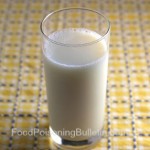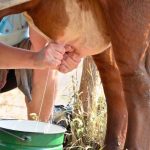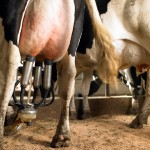A study conducted by the Department of Environmental Health Services at Johns Hopkins Bloomberg School of Public Health and Johns Hopkins Center for a Livable Future has found that the benefits of consuming raw milk do not outweigh the risks. The study was done for the Maryland General Assembly as they consider a bill to legalize the on-farm sale of unpasteurized milk in that state. The study, which was completed in December 2014 but just released to the public, states, "Overall, our review identified no evidence that the potential benefits of consuming raw milk outweigh the known risks." The bill, House Bill 3 was introduced to the Maryland House of Delegates during the 2014 session. The researchers looked at the scientific literature for studies regarding health benefits and risks … [Read more...]
Johns Hopkins Review: Raw Milk Carries Higher Risk of Food Poisoning Than Pasteurized
The Johns Hopkins Bloomberg School of Public Health conducted a literature review about the food safety of raw milk after a bill allowing the sale of raw milk directly to consumers was introduced to the Maryland House of Delegates during the 2014 session. Researchers examined the scientific literature regarding the health benefits and risks of raw and pasteurized cow milk. They examined 81 articles of peer-reviewed literature. "Based on our review of the scientific evidence, we conclude that drinking raw milk carries an increased risk of foodborne illness as compared to drinking pasteurized milk," they stated in their report. "We identified several articles that detected a relationship between drinking raw milk and reduced allergies among rural children and infants. The underlying … [Read more...]
Claravale Raw Milk May be Associated with Campylobacter Outbreak
The California Department of Public Health warned consumers that consumption of unpasteurized (raw) milk may cause serious illness. Six people in northern California have been diagnosed with campylobacteriosis, a serious infection caused by Campylobacter bacteria. Multiple bottles of raw milk from Claravale Farm have tested positive for Campylobacter and have been recalled. In 2012, raw milk from Claravale farm sickened at least 22 people with Campylobacter. In this latest recall, raw milk, raw nonfat milk and raw cream from Claravale Farm in San Benito county with code dates of "MAR 28 and earlier should be disposed. Retailers should not sell it, and consumers should not drink it. The symptoms of a Campylobacter infection include diarrhea that is often bloody, abdominal cramping and … [Read more...]
Kentucky E. coli Outbreak Associated with Raw Milk in 2014
An E. coli outbreak in Kentucky in September 2014 was associated with raw milk consumption, according to the Kentucky Public Health Department. Five children in North Central Kentucky were sickened after drinking unpasteurized milk. Four of the children developed hemolytic uremic syndrome (HUS), a serious and life-threatening complication of this infection and had to be hospitalized. Dr. Stephanie Mayfield, DPH Commissioner said in a statement, "at this time, we know that all of the children consumed unpasteurized milk, which is different from the milk and dairy products you purchase at the grocery store. Unpasteurized milk is dangerous and has not undergone a process to kill bacteria before it is consumed, meaning it could contain disease-causing agents such as E. coli." Attorney … [Read more...]
Wyoming Steps Closer to Legal Raw Milk, More Food Poisoning, Critics Charge
A bill that would legalize the sale of raw milk and home-grown food has passed both houses of the Wyoming State Legislature. But critics say the bill, called the Food Freedom Act, contains no consumer protections and will put people at risk for serious illness and death from food poisoning. The Wyoming Tribune Eagle editorial page said a better name for the bill would be the Food Illness Bill. The Wyoming Senate voted 20-8, with one abstention, to pass the bill. Criticism of the bill does not fall along part lines. Sen. Chris Rothfuss, D-Laramie, Sen. Charlie Scott, R-Casper and Sen. Fred Emerich, R-Cheyenne are all opposed to the idea. Before a fine version heads to Gov. Matt Mead, it will likely be sent to a conference committee. Because it is not pasteurized, raw milk can contain … [Read more...]
CDC Study: Increase in Raw Milk Food Poisoning Outbreaks
The Centers for Disease Control and Prevention has released a new study in Emerging Infectious Diseases stating that the number of food poisoning outbreaks in the United States caused by raw (unpasteurized) milk increased from 30 in 2007 - 2009 to 51 in 2010 - 2012. Most of the outbreaks were caused by Campylobacter bacteria, and most occurred in states where the sale of raw milk is legal. Most worryingly, this increase in outbreaks happened at the same time there was a decline in the number of states where raw milk sales are legal, from 28 in 2004 to 20 in 2011. A food poisoning outbreak is defined as two or more cases of a similar illness resulting from eating a common food. The outbreaks caused by raw milk resulted in 979 illness and 73 hospitalizations. The bacteria responsible … [Read more...]
New CDC Study Shows Increase in Raw Milk-Associated Outbreaks
A new study published December 10, 2014 in the Center for Disease Control and Prevention's Emerging Infectious Diseases Journal shows that the average number of yearly outbreaks due to drinking raw milk more than quadrupled from the last study conducted eight years ago. There was an average of three outbreaks every year during the time period of 1993 to 2006. During the time period of 2007 to 2012, there were 13 outbreaks every year. Overall, there were 81 outbreaks associated with raw milk from 2007 to 2012. Almost 1,000 people were sickened and 73 hospitalized as a result of their illnesses. And more than 80% of the outbreaks occurred in states where raw milk sales are legal. As more states allow the sale of raw milk, outbreaks are rapidly increasing. Eight states have legalized … [Read more...]
Is Drinking Raw Milk a Right?
Is drinking raw milk a right? Raw milk advocates in Wisconsin say that's a question they want the state Supreme Court to decide and they say they plan to file petitions this week to make that happen. Because it is considered a public health risk, the U.S. Food and Drug Administration (FDA) bans the interstate sale or distribution of raw milk. Any milk sold across state lines must be pasteurized. Although the FDA advises that states also allow the sale of pasteurized milk only, each state is free to determine its own raw milk regulations. Seventeen states have a complete ban. They include: Alabama, Alaska, Delaware, Florida, Georgia, Hawaii, Indiana, Iowa, Louisiana, Maryland, Michigan,Montana, New Jersey, North Carolina, North Dakota, Virginia, and West Virginia. Eleven states allow … [Read more...]
Raw Milk and Children, A Dangerous Combination
An E. coli outbreak in Kentucky has sickened five children, four of whom are hospitalized with hemolytic uremic syndrome (HUS), a life-threatening condition that strikes young E.coli patients. The outbreak is the latest example of how children are disproportionately affected by illnesses associated with raw milk products and more likely than adults to suffer severe illness. This preventable, undue burden of illness on children is "primarily related to misinformation regarding the purported benefits of these raw dairy products," according to the American Academy of Pediatrics. For example, some raw milk advocates claim that raw milk can cure asthma, allergies and lactose intolerance. However, there is no scientific evidence to support these claims. What science has shown, is that raw milk … [Read more...]
Cryptosporidium in Raw Milk Sickens 2 in Idaho
Cryptosporidium in raw goat milk from Treasured Sunrise Farm in Parma, Idaho has sickened at least two people. Consumers who have purchased raw goat milk from the farm on or after August 24 should not drink it. The milk was sold in stores in Boise, Caldwell, Ketchum, and Star. Cryptosporidium is a parasite that is spread when microscopic amounts of feces from an infected human or animal are ingested. It takes fewer than 10 organisms to cause an infection. Outbreaks are commonly associated with water parks and daycare centers. There isn't a drug that effectively treats a cryptosporidium infection which puts immune compromised individuals at significant risk. Symptoms, which usually develop between two and 10 days of exposure, include: watery diarrhea, abdominal cramps, nausea, fever, … [Read more...]








